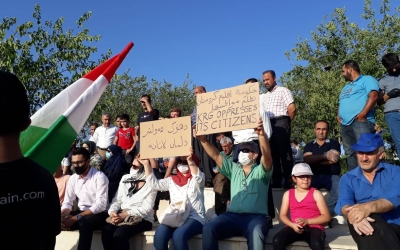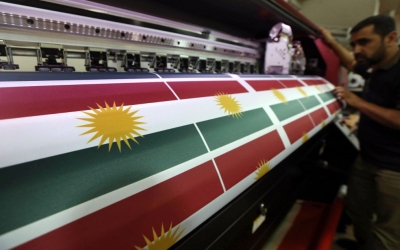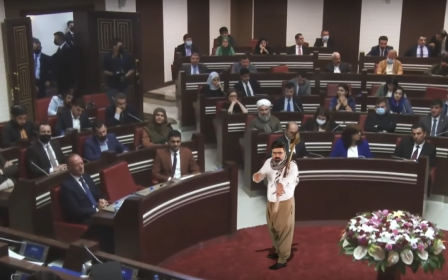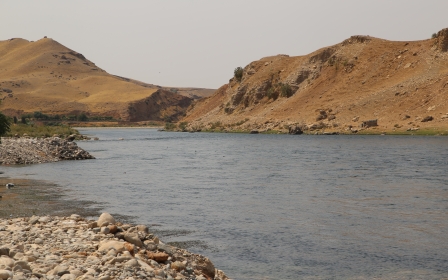Iraq: Alarm raised over free speech in Kurdistan after jailing of journalists
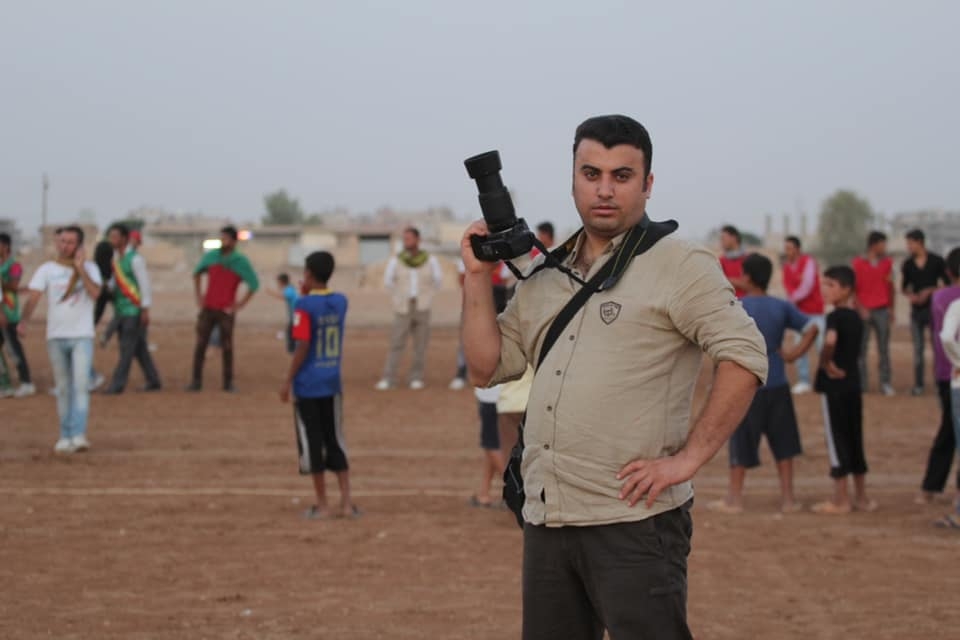
The sentencing of two Iraqi Kurdish journalists and three activists, with one saying he was threatened into giving a false confession, days after the Kurdish prime minister accused them of being spies, has raised questions about the independence of the region's judiciary.
On 16 February, journalists Sherwan Amin Sherwani and Guhdar Zebari, together with activists Shvan Saeed, Ayaz Karam and Hariwan Issa, were found guilty by Erbil's Second Court of First Instance of "endangering the national security of the Kurdistan Region" and were each sentenced to six years in prison.
A week prior to the ruling, Masrour Barzani, prime minister of the Iraqi Kurdistan Regional Government (KRG), claimed in a press conference that the detainees were "neither activists nor journalists. Some of them were spies. They spied for other countries… Some were saboteurs".
Following the decision by Erbil’s court, the KRG and Kurdish ruling parties have been accused of interfering in the region’s judiciary and curbing the freedom of the press.
The two-day trial was attended by rights groups, parliamentarians and family members of the detainees, including Sherwani's wife and young children.
Sherwani, a journalist critical of the government and former editor-in-chief of monthly magazine Bashur, along with tens of other activists and teachers, was arrested in October last year following his coverage of anti-government protests in Duhok and Erbil provinces over corruption and unpaid salaries.
Rape threats
Kurdish lawmaker Ali Hama Salih, from the Change Movement bloc, on Thursday wrote in a Facebook post that during the trial, Sherwani repeatedly said that he was threatened by Kurdish security during interrogation sessions with the rape of his wife if he did not confess to the things he was accused of.
"I think Barzani's previous accusations against the detainees had largely impacted the court’s decision. I think all the five prisoners are not guilty," Hama Salih told Middle East Eye in a phone interview.
"We will increase our efforts so that the region’s appeals court independently and professionally reviews the decision."
'We have already heard that the Kurdish security authorities are using such an inhumane tactic to retrieve false confessions from detainees'
- Mohammed Abdulla, lawyer
Mohammed Abdulla, Sherwani's lawyer, told MEE that the judge and the public prosecution had ignored Sherwani’s statements when he addressed the court that the security officers had threatened to hurt his wife.
"The public prosecution should have initiated an investigation on this crime and other breaches of the law committed against Sherwani, including altering his testimony and torturing him into providing the password to his laptop.
"I think Sherwani’s mentioning the threats against his wife indicate that he had confessed under coercion, as we have already heard that the Kurdish security authorities are using such an inhumane tactic to retrieve false confessions from detainees."
Rugash Izzaddin Muheiadin, Sherwani's wife, who spoke to MEE over the phone, confirmed the statements from Salih and Abdulla regarding the threat to her if Sherwani did not confess.
She said, however, that she would not file a lawsuit against the Kurdish authorities if such a move would aggravate her husband’s legal case, otherwise she would have taken legal measures.
A politically motivated case
Abdulla also said that "weak and baseless" evidence, including journalistic material, was presented by the Kurdistan Security Council as evidence against the men in the espionage charges.
He described the case as "politically motivated", since the journalists were critical of widescale corruption in the Kurdistan region.
He said they were now working to appeal against the decision of the court, which is under the control of the executive authority, within a month. But Abdulla, who does not regard the judiciary as independent, expressed pessimism, saying that the appeals court might even increase the sentence.
KRG President Nechirvan Barzani said in a statement on Thursday that he was following up with the court’s decision which had caused public concern.
"In accordance with the law, the defendants have the right to appeal the decision, and the Court of Appeal is obligated to review the decision in a way that upholds the legal and human rights of the defendants and the plaintiffs," read Barzani's statement.
International condemnations
The United States embassy in Baghdad said that it was also closely following the detentions of journalists and activists and the subsequent trials.
"The US has consistently engaged on the issue of freedom of expression, including for members of the press, with KRG officials and will continue to do so," the embassy said in a statement on Friday.
"Democratic societies respect freedom and expression and support the ability of press members to report without fear of retaliation."
Meanwhile, the Committee to Protect Journalists (CPJ) denounced the court’s ruling and called for the journalists’ immediate release and for the charges to be dropped.
"Today's sentencing of journalists Sherwan Amin Sherwani and Guhdar Zebari is not only unfair and disproportionate, but it also proves that the Iraqi Kurdistan Regional Government has finally dropped the pretence of caring about press freedom," said CPJ Middle East and North Africa Representative Ignacio Miguel Delgado Culebras in a statement.
Kurdish government spokesperson Jutyar Adil told MEE that the KRG respected and supported the judiciary’s decisions.
"No one can interfere in the decisions taken by the judiciary system," he said.
Manipulation
The KRG Coordinator for International Advocacy Dindar Zebari claimed in a statement to the CPJ that the convictions were unrelated to the journalists’ work.
"[They] were found guilty of gathering classified information and passing it covertly to foreign actors in exchange for substantial sums of money" and of illegally possessing weapons, Zebari said.
Sherwani's lawyer said that his client had denied all the charges and that there was no proof of illegally possessing weapons, participation in armed activities or confiscation of guns by authorities.
'The trial was clearly manipulated by a political agenda, whose goal seems to be to subdue the freedom of expression'
- Kamaran Osman, CPT member
Kamaran Osman, a member of the Christian Peacemaker Teams (CPT), an international human rights organisation, told MEE that the CPT had attended the trials and found the material used as evidence as “very concerning”.
"Private conversations with friends, in which some of the accused criticised the government, were brought as 'evidence for preparing violent attacks', while there was nothing that would indicate any planning of sabotage," Osman said.
"Other evidence [material used] were photos that Sherwan Sherwani used in his journalism work… No evidence showed that Sherwan had any armed collaborators.
"The trial was clearly manipulated by a political agenda, whose goal seems to be to subdue the freedom of expression."
Osman said that the convicted five had started a hunger strike in protest against the unjust sentences.
According to statistics by the Kurdistan Journalists Syndicate, five journalists were assassinated between 2008 and 2016, and more than 2,000 law violations against journalists have been recorded since 2008.
Niaz Abdulla, an independent Kurdish journalist, who has also been threatened and put on trial, told MEE that, since 1991, Kurdish authorities have used media channels as propaganda tools to polish the government’s image.
"It has portrayed a fake image to the international community that the region is a place for democracy and freedom of expression, all the while curbing the free press through courts," she said.
Middle East Eye propose une couverture et une analyse indépendantes et incomparables du Moyen-Orient, de l’Afrique du Nord et d’autres régions du monde. Pour en savoir plus sur la reprise de ce contenu et les frais qui s’appliquent, veuillez remplir ce formulaire [en anglais]. Pour en savoir plus sur MEE, cliquez ici [en anglais].


